ANNOYING
SEX/
FETISH
1. “Everyone creates stereotypes. We cannot function in the world without them.” (S. Gilman)
1.1 Revisit the first exercise (mapping of you & the other). What are the assumptions you (still) have about the ‘user group’? How were they debunked or confirmed?
I think there are two bigger categories within the user group, first the «average party-goer», who is very superficial and wants to show off their money, clothes and prestige, the music and experience are not very important, or it’s usually very charts orientated. These people also seem to be troublemakers and aggressively drunk.
Then there are «the subculture/underground partygoers», who seem to be the ones who give the experience more important than the money. Moreover, they seem to be more easily recognizable, because of their fashion style, ideologies (mostly left orientated) and also just a specific vibe that they give offer.
Most of my assumptions were confirmed because that is what the lifestyle consists of, but at the same time, the negative assumptions are based on escalations, which then are taken to give those partygoers a bad name. Moreover, I always thought that the nightlife was scarier than it is, but actually, most people just do their thing and respect your choices (hopefully).
1.2 Write down your personal interest in this group? What are you curious about? How do you relate to this group (positive of negative); do you want to be part of it, do you admire them, are you more negative about them?
I’m interested in this group because it is a neglected part of society, especially now with covid and I think those people are often misunderstood and put actively in a bad light. Parents seem to use this user group as a bad example to scare their children into not doing drugs etc. Plus, the interest of the group is a very specific one, which is about having a safe place and having unique experiences. I’m curious about what they expect from a good night and also if they only want to party on a very intense level or if this fluctuates. I haven’t discovered that much of the nightlife, since the nightlife in my home country is very small and catered to a broad audience. I wished I could relate more to this user group, but first of all, I haven’t had enough experience, neither am I as carefree as the people in that user group seem to be. I admire them a lot because these people live a lot at the moment, are very spontaneous and are very true to themselves.
2. Signifiers that stereotype: Objects and their meaning
2.1 Which existing stereotypes have you found about your group? Describe them.
I found that the creatures of the night seem to be described as troublemakers, like vandalizing property, being loud and rioting, since the nighttime is a «good» time for illegal activities. Besides, they take/drink to use a lot of drugs and alcohol, which makes people do weird things since they are tripping, also based on media, it’s always presented as if they would force you to also take drugs. Sex always plays a big role in that area, since it’s a good pool to find people, and you can find easier a one-night stand since you might never again see them and because other people are also looking for the same thing. The fact is that most of the user group are people in their 20s. Media also seems to portray them as the life of the party and very intense.
2.2 Fragmentation and Fetishized: Which objects (e.g. food, products, clothes, part of the body) are used to stereotype with? Where did you find them? In which shape, form or media (jokes, sayings, news, tv, politics, shops, history, education,…)
I think most of stereotyping comes from media, for the more positive views, it comes from movies/series/etc that portray nights out as something completely crazy since most people won’t be in that crazy of parties as shown in the movies. When it comes to the negative side, you can also find this in the film industry, but mostly in the news, that shows that the nights end badly and how the illegal activity shoots up at night.
Objects that are associated with the user group are: solo cup(usually red or blue), alcohol, drugs, light shows, fog sometimes, loud music, a specific fashion style.
3. The effect of stereotypes: Power and discrimination
3.1 Who spreads these stereotypes about your usergroup? What do you assume their intention is? Did you find examples of discrimination, ongoing conflicts, historic events or other injustices where stereotypes are used to control or overpower your ‘user group’? Which system of oppression is it part of (racism, classism, agism, sexism?
I feel like most adults over 40 spread these kinds of messages to put off their children from becoming like them. It is often people who feel disturbed by the noise, trash, behaviour, etc.
I assume they intend to give them a bad name, so they first hand can profit from their bad image, and be less disturbed. Plus creatures of the night are often also considered not godly, so it can also go against their beliefs.
One good example right now, is that the nightlife sector hasn’t been opened up for more than a year and the government also doesn’t seem to care much about it, so the clubs close. Moreover, subcultures and minorities seem to find/create their safe place within the night, so whenever a place becomes more popular, people seemed to target those much faster. This happened with black people at the time of Disco, with different kinds of minorities with House music being pushed to d illegal raves in forests or also with the LGBTQ community that is targeted by the police and homophobic people to attack them at their safe place. These three examples also had to suffer from exaggeration as soon as one bad thing happened at a place that is connotated with that culture. So I’d say mostly racism and classicism play a bigger role in this, as sexism is just an omnipresent factor.
3.2 Have you found examples where your ‘social group’ is reversing the stereotype; using the known stereotypes and appropriating them for their own cause? (see more Hall, 5.1: Reversing the stereotype).
I feel like especially alternative groups, try to work with stricter rules, so they can stop de-escalations and win back a good reputation. Another technique could be to get the awareness of their problems or raise money for the community, which is always seen as an act of kindness. Moreover, I think Intruders are also thrown out much quicker, so they cannot start any trouble.
1.1 Revisit the first exercise (mapping of you & the other). What are the assumptions you (still) have about the ‘user group’? How were they debunked or confirmed?
I have realised that there are many different people that can be defined as a ‘Creature of the Night’ and they come in all different races, gender, sexuality, religion, etc but pretty much all of them go out to enjoy themselves, meet new people, experience new events and also to make memories they will remember when they’re older.
I have noticed that there are two main types of ravers, people that go to the club or festival to be truly immersed in the music and the other type is people that spend the whole time updating their Snapchat or Instagram story and they care more about being seen and who sees them than the actual event.
Queer people want a safe space they can go to to openly socialise and meet the same sex without fear of abuse or prosecution. They want to explore their identity, especially if they come from homophobic families. They want to feel understood and have similar experiences with other queer people. Queer communities cannot practice the safety measures for COVID-19 and social distancing is nearly impossible. For more than two decades, gay bars, especially those owned by POC have been disappearing. In the 1980’s there was over 1,500 gay bars in the US. This number declined steeply in the 90’s and fewer than 1000 today*. Between 2007 and 2019, LGBTQ+ bar listings have dropped by 37%. Why? Gentrification and sky rocketing rents along with dating apps.
I know this from listening to podcasts, reading articles and watching videos.
*Mattson, Greggor. ‘Are Gay Bars Closing? Using Business Listings to Infer Rates of Gay Bar Closure in the United States, 1977–2019’. Socius, vol. 5, Jan. 2019, p. 2378023119894832. SAGE Journals, doi:10.1177/2378023119894832.
1.2 Write down your personal interest in this group? What are you curious about? How do you relate to this group (positive of negative); do you want to be part of it, do you admire them, are you more negative about them?
I am curious about this group because I am a big fan of nightlife culture, history and also clubbing. I also feel that more and more people my age and younger are starting to experience nightlife for the first time and need safe spaces to go to if they are part of the LGBTQ+ community. I have been to a few queer only raves and they have been some of the most enjoyable nights of my life. I felt so alive. People dressed up and some people wore next to nothing, which they wouldn’t be able to do in a regular bar or club. It was finally a space where people felt like they belonged. I feel like it is so important for the younger generation, some who haven’t experienced it yet, so feel safe in spaces like those.
In Ireland, nightlife played a huge part of my life. I’d go to clubs maybe once or twice a month. I have yet to experience proper nightlife here in Rotterdam, but I have heard stories and I know it is going to be good when it all opens up again. I admire people that do go to clubs and when I was younger I would always look up old 90’s rave photographs and just think how cool the people looked and how I wanted to be like that when I was older.
2. Signifiers that stereotype: Objects and their meaning
2.1 Which existing stereotypes have you found about your group? Describe them.
There’s a lot of negative stereotypes that surrounds nightlife culture, especially raving culture. That is drugs. Drugs are not as accepted in the ‘norm’ as I feel they should be. If you are knowledgeable about what you are taking, have whatever it is tested and with people you trust, then you should be fine. Mainly older, and a few younger people, have negative connotations around the word ‘drug’ and when some people hear the word, their immediate reaction is: poor, homeless, smelly, waste of space, junkie, addiction, crackhead, etc. but that is not the case. That is a certain part of drugs which I do not want to get into, but what some people don’t realise all sorts of people do drugs. I’ve met lawyers, primary school teachers, accountants, baristas, shop workers, flight attendants, etc. that do drugs. Party Goers are also described as being loud, messy, drunk, annoying, superficial, etc.
2.2 Fragmentation and Fetishized: Which objects (e.g. food, products, clothes, part of the body) are used to stereotype with? Where did you find them? In which shape, form or media (jokes, sayings, news, tv, politics, shops, history, education,…)
It is mostly shown through TV, music, film, papers and also the news channel which seem to only focus on the negative parts and very rarely the positive parts of the nightlife experience. A lot of negative sides of nightlife culture, drugs and alcohol, etc is shown through movies and TV programs where the main character(s) become addicted and dependant on drug(s) or alcohol, and that is not always the case. Not everyone becomes addicted.
It is shown through objects such as glass bottles, needles, drug bags, fashion, music, makeup, sex toys and gear, etc.
3. The effect of stereotypes: Power and discrimination
3.1 Who spreads these stereotypes about your usergroup? What do you assume their intention is? Did you find examples of discrimination, ongoing conflicts, historic events or other injustices where stereotypes are used to control or overpower your ‘user group’? Which system of oppression is it part of (racism, classism, agism, sexism?
I think it is mainly the older generation that throw these negative stereotypes around because they might lived through a completely different era where religion was prevalent and clothing unlike today where we are allowed with more ease to dress how we want, act how we want, love who we want.
The 1990 Entertainment Act and the 1994 Criminal Justice Act in the UK attempted to make it more difficult for rave organisers to hold raves, which led to police to crackdown the events and the media began heavily publicizing some of the drug related deaths in the rave scene to cause a sense of panic among the mainstream.
I’ve found a lot of examples of discrimination where members of the LGBTQ+ community have been punished for being who they truly are. Take the Gay Liberation Front for example which is based in New York city and are gay liberation groups that formed after the Stonewall riots, in which police clashed with gay demonstrators. Police have been raiding queer spaces since 1904 where they raided the Ariston Bathouse in New York City and detained 60 men, and even recently where they raided The Blazing Saddle in Des Moines, Iowa. Yes, we’ve come a long way in terms of acceptance and not all police men participate in these acts but they are part of system that do, and that’s not right. There is racism involved, classism, sexism, homophobia and also ableism
3.2 Have you found examples where your ‘social group’ is reversing the stereotype; using the known stereotypes and appropriating them for their own cause? (see more Hall, 5.1: Reversing the stereotype).
Yes, a lot of people are fighting back in the form of riots and protests.
“Everyone creates stereotypes. We cannot function in the world without them.” (S. Gilman)
1.1 Revisit the first exercise (mapping of you & the other). What are the assumptions you (still) have about the ‘user group’? How were they debunked or confirmed?
A creature of the night can be anyone of course, but I immediately thought of people of my age that love to go to clubs, parties and raves. I must confess that there is a small part of me that still sees this group as people that drink a lot / do a lot of drugs and go out every weekend. I think that has to do with the way the media presents this group and the way I got raised. Until three years ago I wasn’t a part of that group and I had no idea how they lived their lives and how clubbing actually was in reality. My parents have always said that drugs are bad for you, period. But they didn’t seem to mind me drinking a lot on a fun night with friends. Kind of a double standard, right? They didn’t know anything about clubbing or drugs and that’s why they couldn’t teach me anything about it. When I turned 18 and started going out, I felt like I was exploring a part of life that I haven’t experienced before. I also finally started to understand what kind of person I was. I got a relationship with my boyfriend as well and he taught me a lot about music, spirituality, being spontaneous and safe drug use and how fun that can actually be. My idea of party people almost completely changed. I started to identify myself as one. I also started to hate alcohol. I don’t like the way it makes people behave. Some get very aggressive, pushy and annoying. That is not at all the vibe you want. Unfortunately, there are still a lot of people like this out there during the night and I think that is still why a small part of me thinks of this group when I think of party people.
1.2 Write down your personal interest in this group? What are you curious about? How do you relate to this group (positive of negative); do you want to be part of it, do you admire them, are you more negative about them?
I am very much a creature of the night. I’m a night owl and get very inspired during the night. Everything suddenly looks different. I love the silence and serenity outside. I go for walks by myself or with someone else to calm my nerves. But I also love to hop on my bike and go clubbing with friends. I love the way it makes me feel. Like I am free from all my troubles and can actually start to have fun with the people that I love. I have so many great memories from parties and festivals that no one will ever take away from me. Nightlife is so, so important. It is about uniting people that can be themselves, no matter what gender, sexuality, race etc. I believe life is about having fun. Celebrate the fact that you are alive and free and share it with the people around you! I admire creatures of the night a lot (depending on the type of person of course). The people that I admire are the ones that dare to be their amazing selves and never apologise for it. Confidence is something that really draws me. One thing I am really curious about is how people protect themselves from danger during the night, because you might feel very safe in a club where there are similar people, but what about when you go home? This is still a very big problem in nightlife and in society in general. Especially for women and LGBTQI+ people.
2. Signifiers that stereotype: Objects and their meaning
2.1 Which existing stereotypes have you found about your group? Describe them.
I think that there are a lot of types of creatures of the night. My group immediately thinks of young adults that dress like Neo-goths and go to underground techno raves. But of course, that group is not the only creature of the night. That person could be any gender, age, race, sexuality etc. Once I go out, I usually notice four types of groups: The cool people (for me, queer or non queer people that dress really good or edgy and appear very confident), the ‘look at me’ people (girls/women who wear insanely high heels and glitter dresses and are constantly making videos or pictures of each other or boys/men that take their shirt off and order the most expensive bottle of vodka just to appear strong and rich. Lastly, we have the annoying group of people that always drink too much and are never ashamed about it (mostly men from the age of 30+). They also love to all sing along with André Hazes and call everyone ‘schat’. They are extensive Ajax lovers and get aggressive once they don’t get their way.
2.2 Fragmentation and Fetishized: Which objects (e.g. food, products, clothes, part of the body) are used to stereotype with? Where did you find them? In which shape, form or media (jokes, sayings, news, tv, politics, shops, history, education,…)
Stereotypes of club goers is found in the media. Usually in a very negative way. They usually get presented like train wrecks that don’t know how to handle feelings, alcohol or drugs, while in reality there are also a lot of people that aren’t like that at all. There are also a lot of club goers that go out every one or two months and are also safe drug users. You don’t have to be addicted to drugs, in order to be a drug user. That’s just the media trying to tell you you shouldn’t do drugs. There are a lot of movies about the danger of nightlife, but what about the fun of it? Why is that so rare? It’s like people want to avoid promoting clubbing as a positive event. A typical stereotype of a party-lover is usually presented as a young girl during spring-break, wearing a short skirt, a pushup bra and high heels that is drinking while being underage and ends up puking in the hosts’ pool. Young girls are always fetishised this way.
3. The effect of stereotypes: Power and discrimination
3.1 Who spreads these stereotypes about your usergroup? What do you assume their intention is? Did you find examples of discrimination, ongoing conflicts, historic events or other injustices where stereotypes are used to control or overpower your ‘user group’? Which system of oppression is it part of (racism, classism, agism, sexism?
I feel like these stereotypes are spread by (mostly) white men and women of older generations and the media that is controlled by them. They have very different values and beliefs from our generation. What is normal to us, is not always normal to them. I think they want their generation to be kept alive through spreading assumptions, misconceptions and lies about the young generation. Like, for example during the 80s when Aids started to spread and infect a huge part of the gay scene. The media and the older generation of that time said, amongst a lot of other lies, that only homosexuals could get it and that they are getting punished by God for having gay sex. They were behaving very homophobic and people started to believe what they were saying. Like they finally got a ‘good reason’ to call out the gay scene and don’t even bother to do extensive research about what aids was. They really want to scare people off so they can keep their generation in tact.
3.2 Have you found examples where your ‘social group’ is reversing the stereotype; using the known stereotypes and appropriating them for their own cause? (see more Hall, 5.1: Reversing the stereotype).
Oh, definitely! Especially now, people go out on the streets to fight for human rights. (Black Lives Matter, Women’s march etc). Almost every Instagram account posted a black square for the #blacklivesmatter movement after the death of George Floyd. And now, people are celebrating the fact that his murderer (police officer) has been convicted guilty of all the charges.
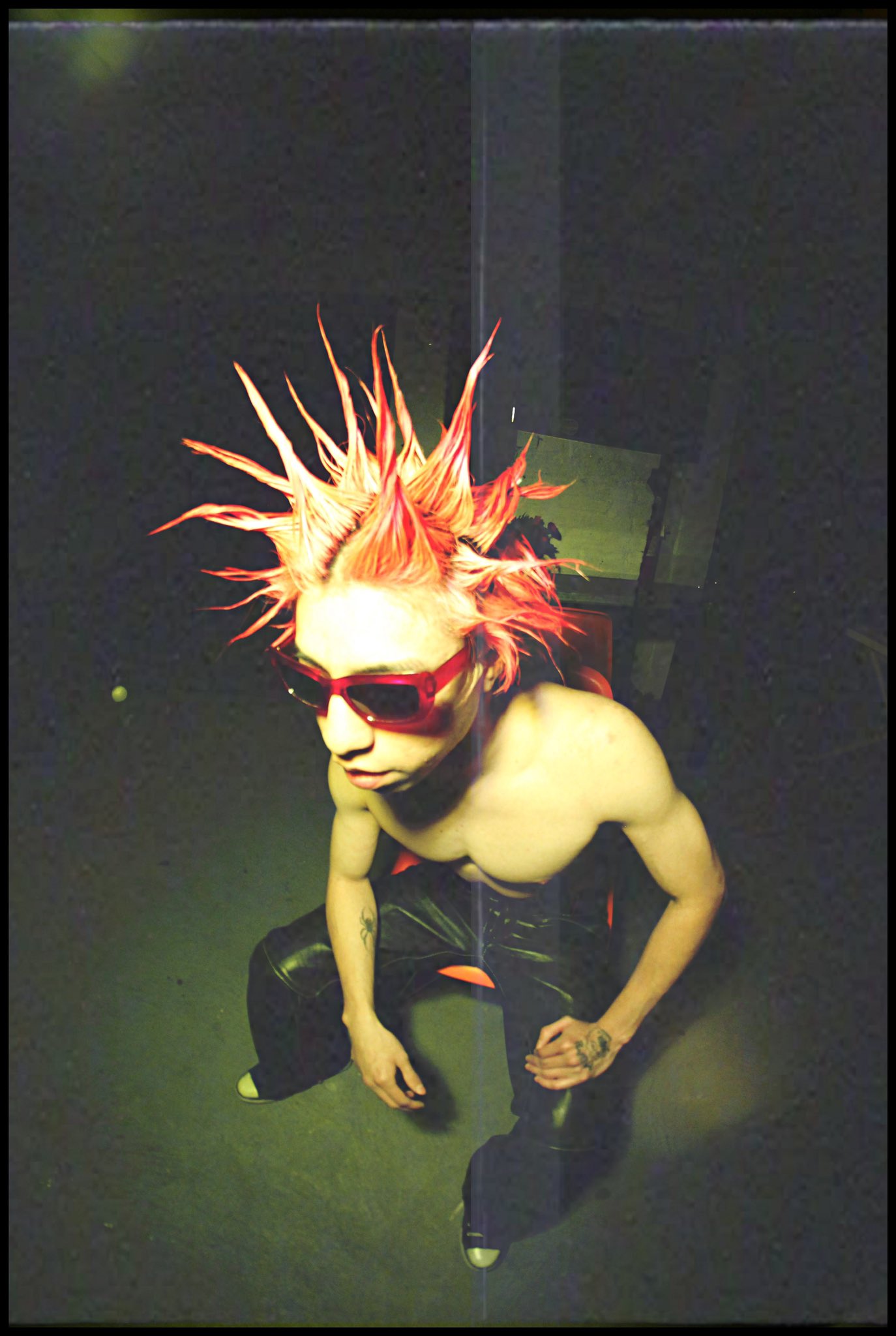
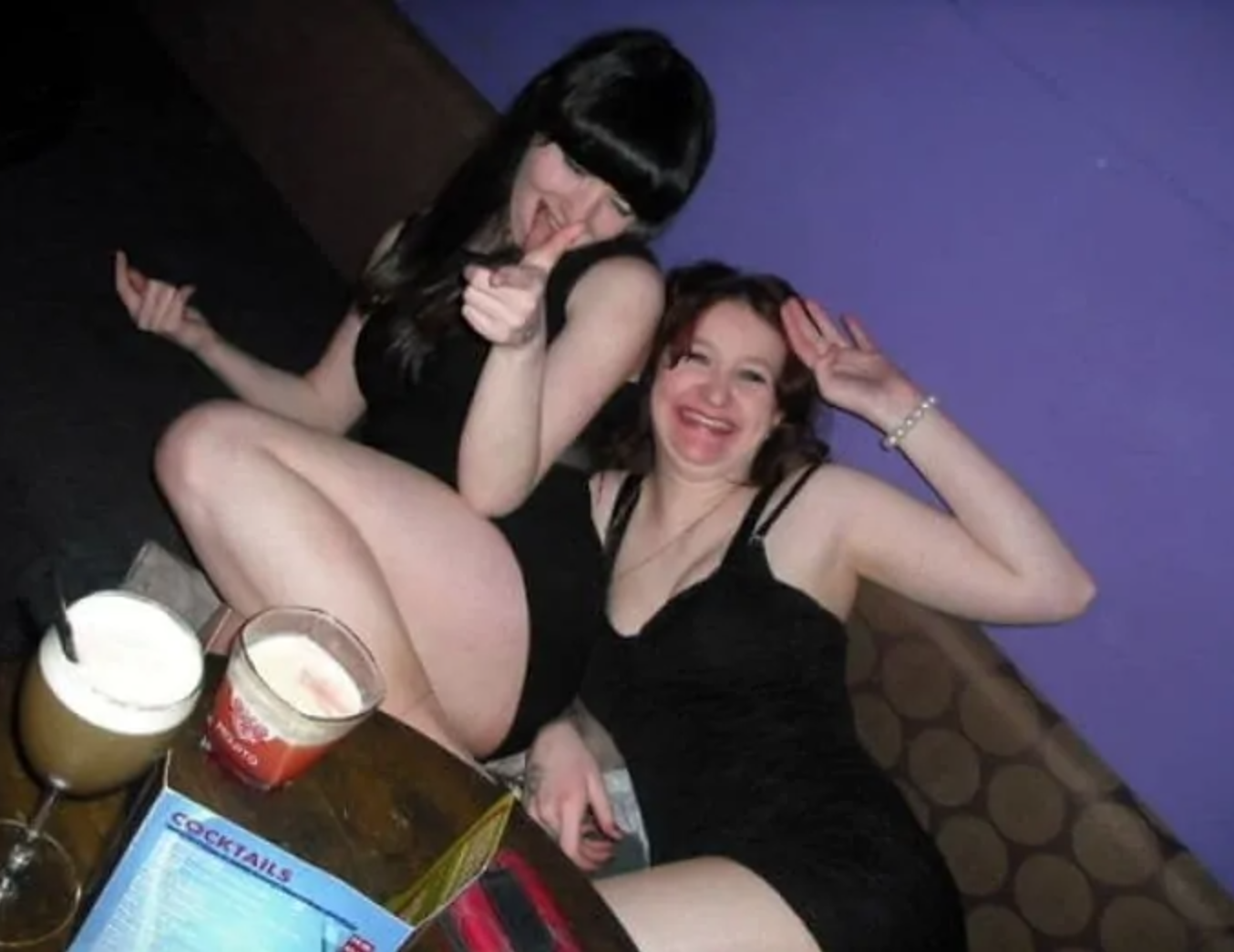
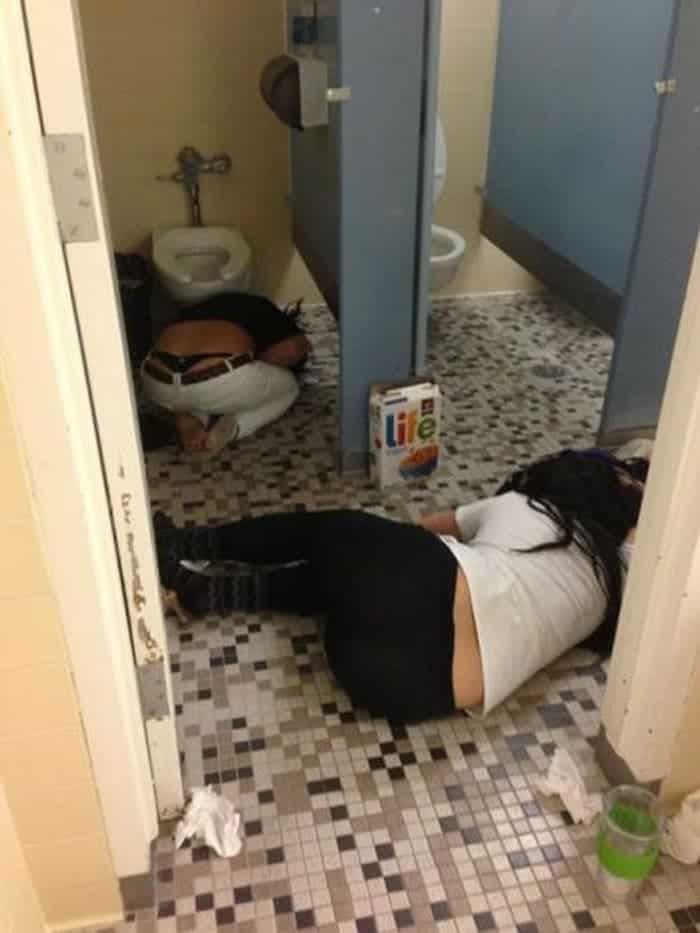
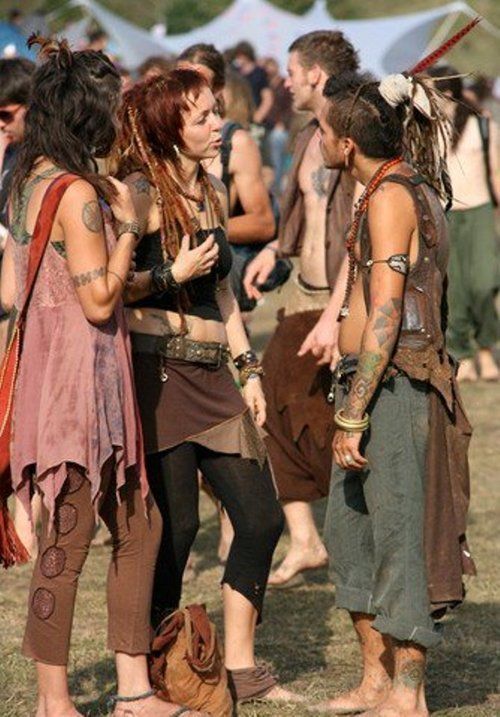
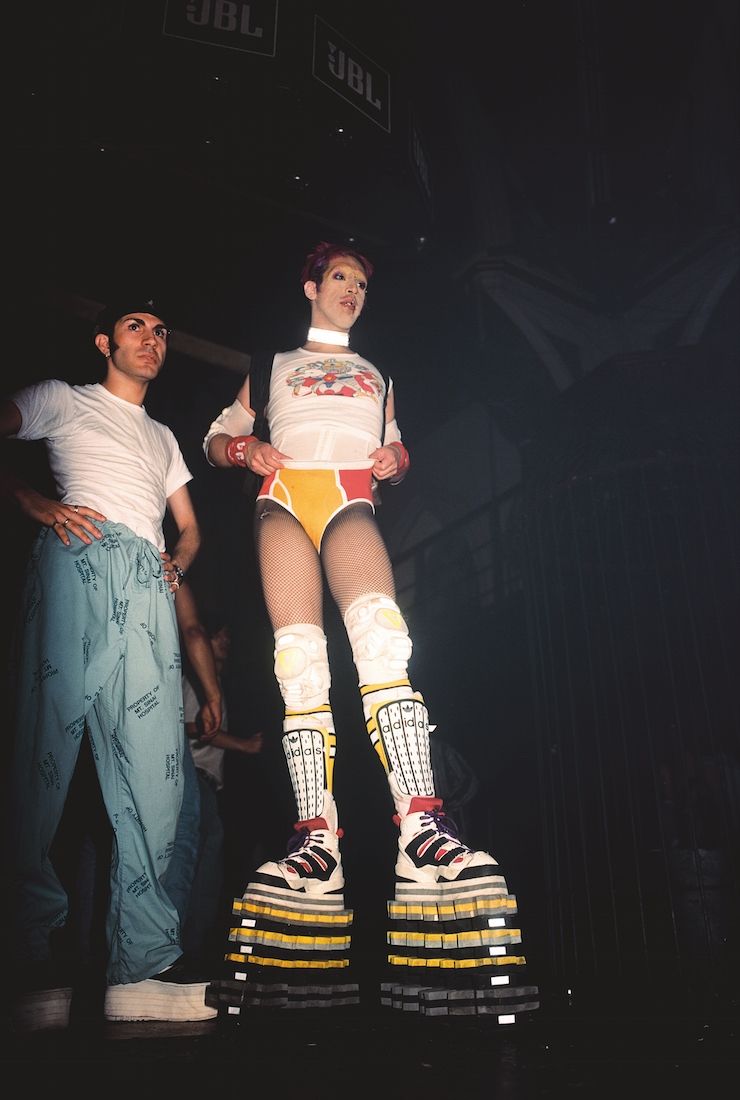
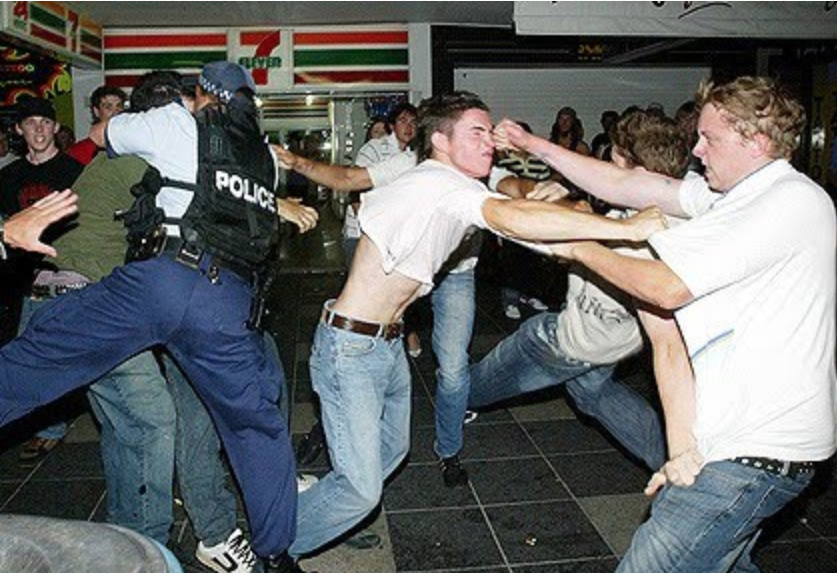
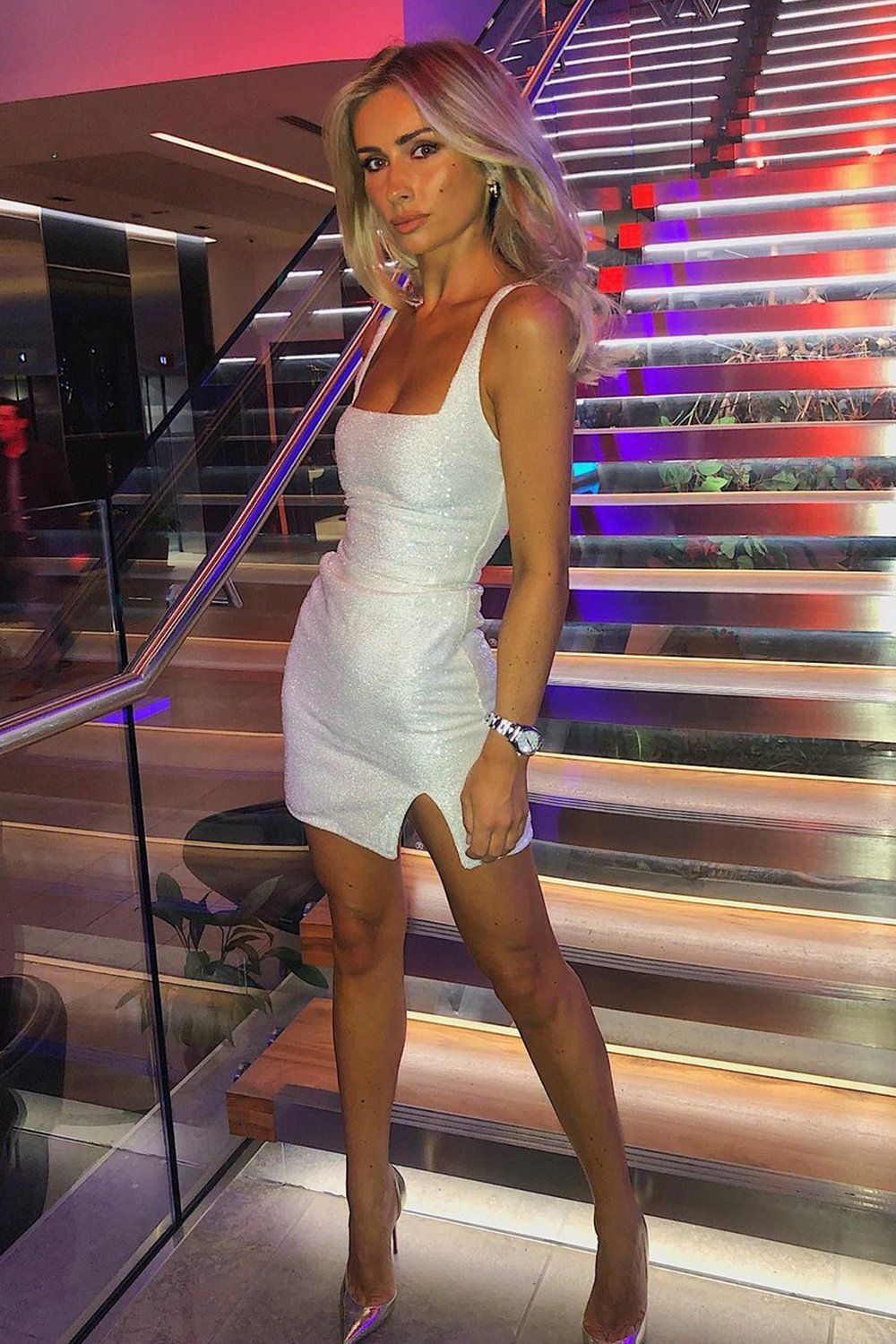
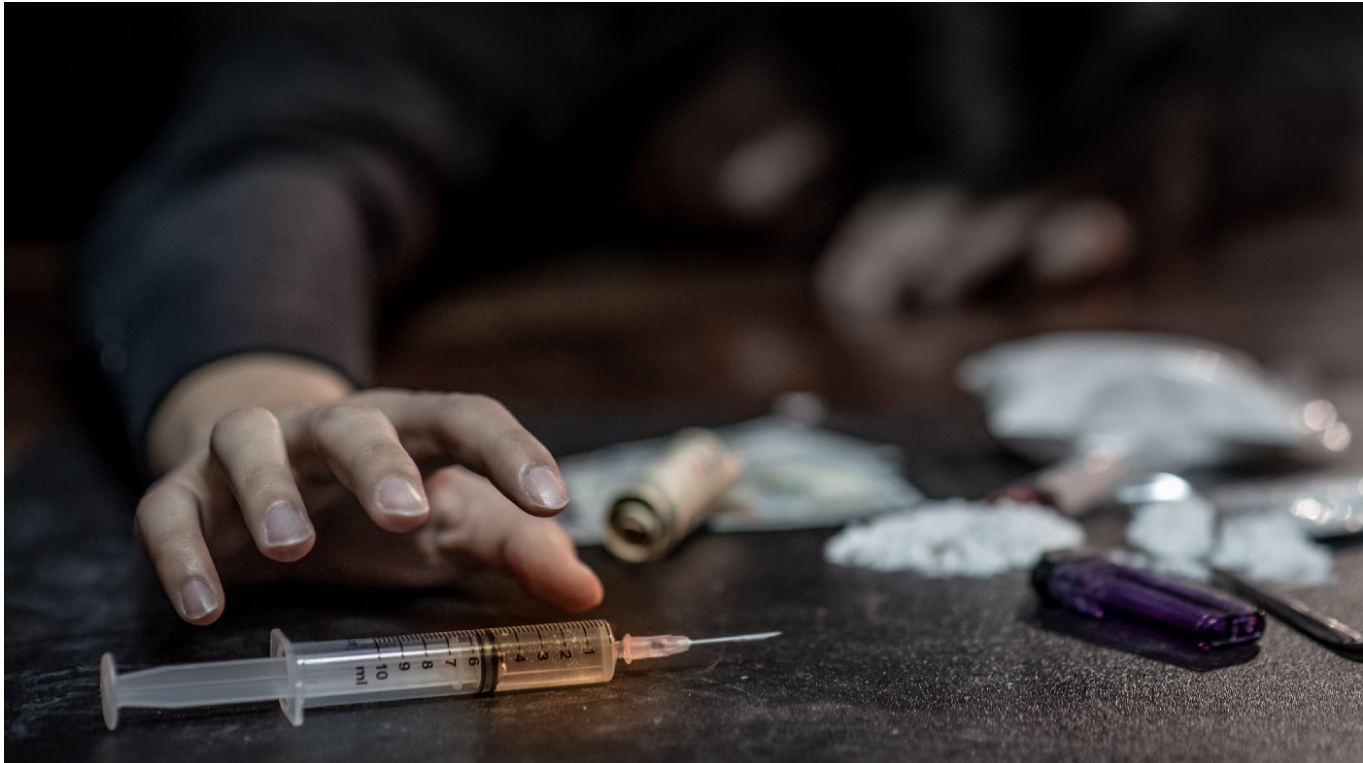
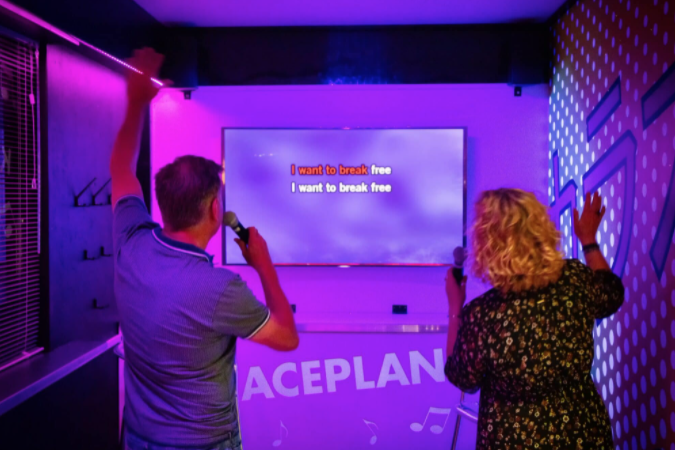



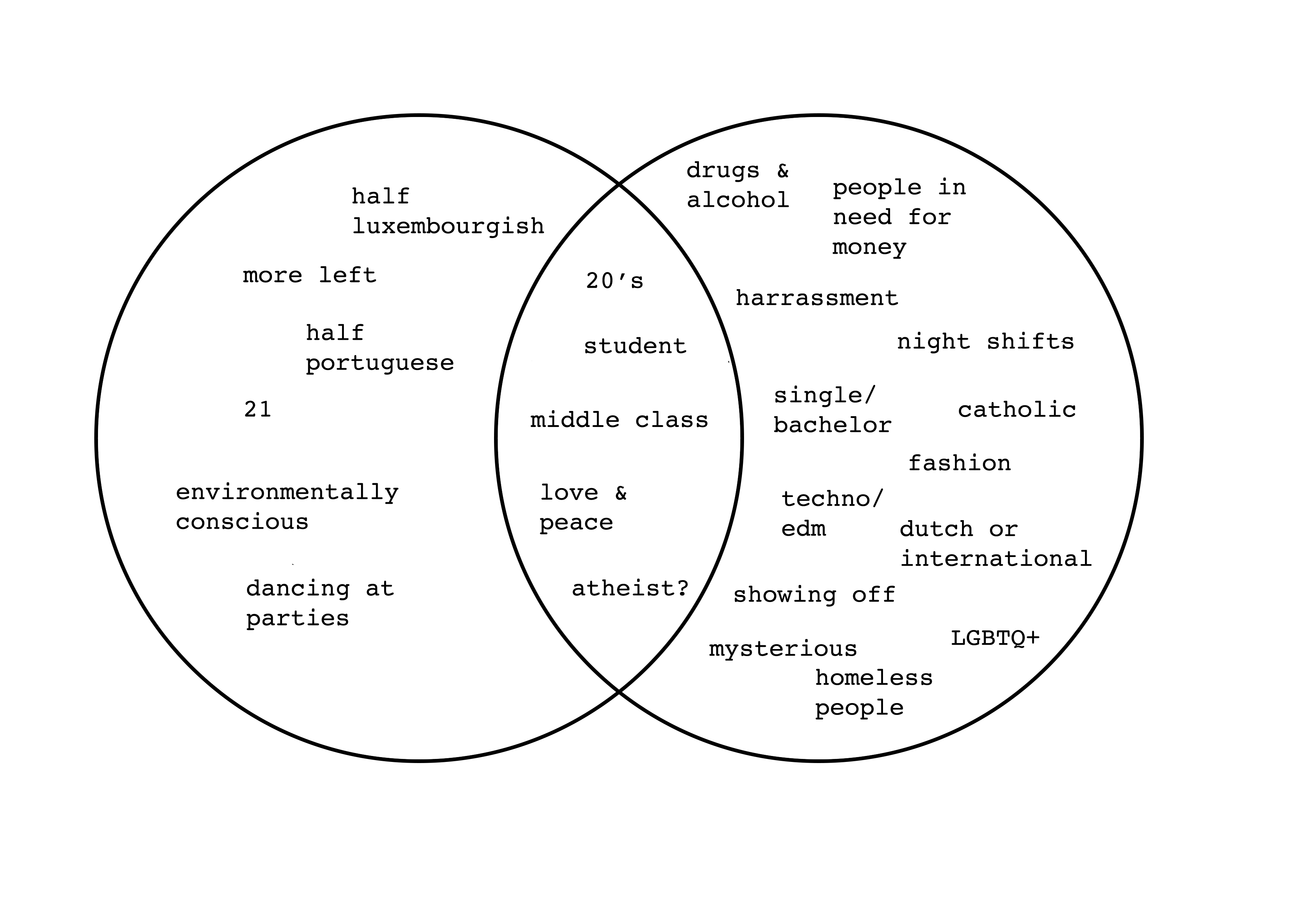
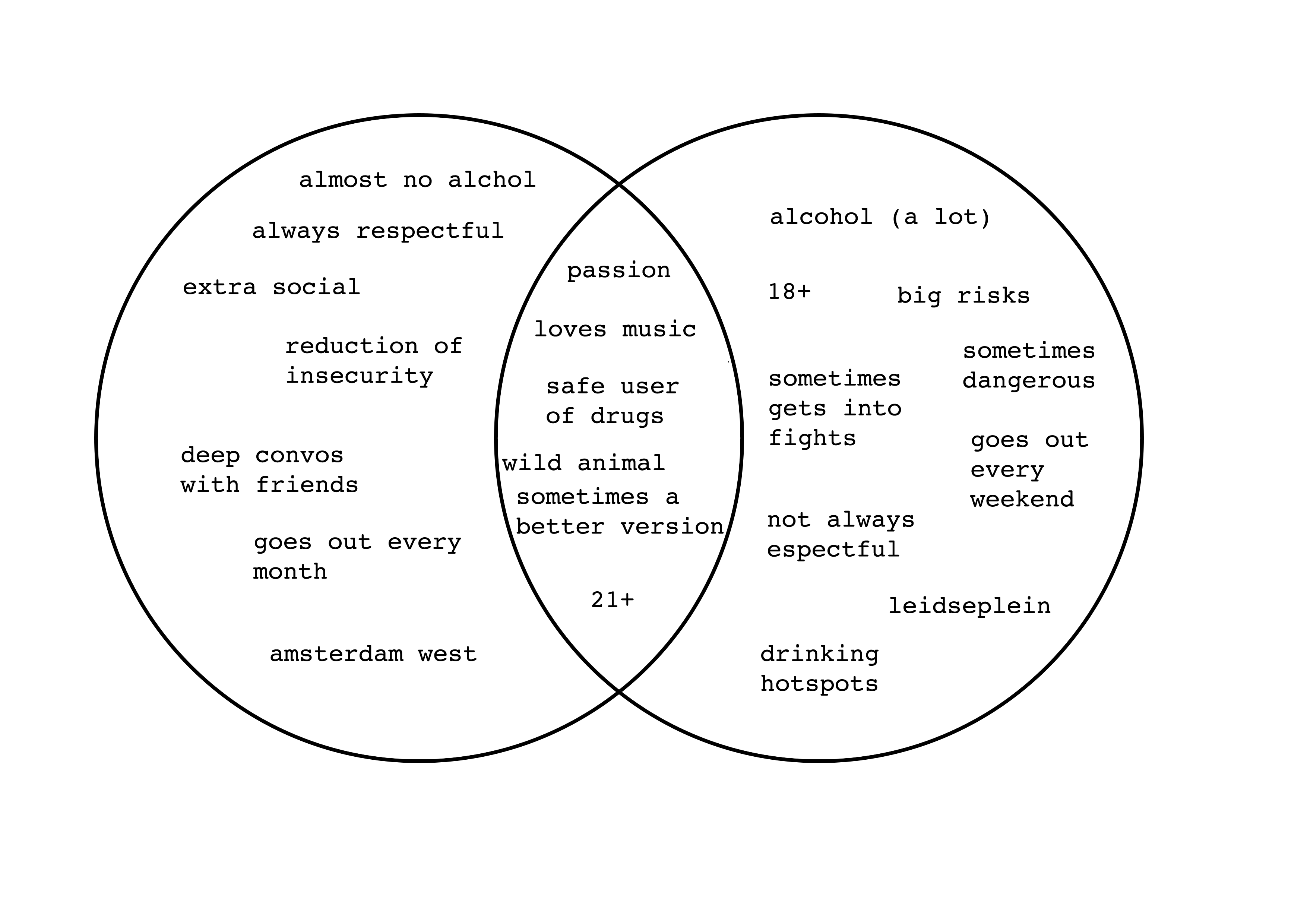
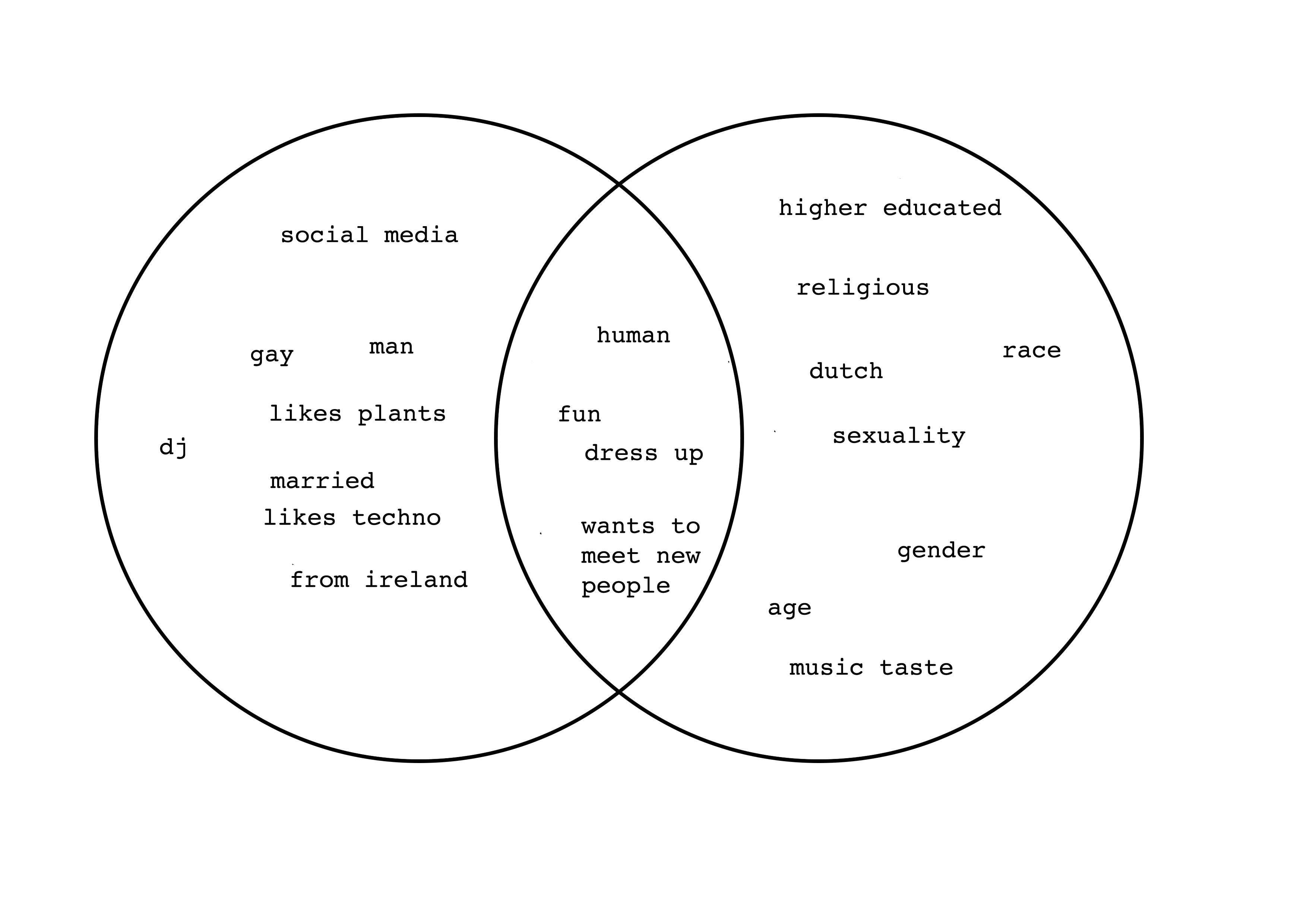
A
N
A
S
A
B
I
N
E
J
O
E
How can drunk/high people connect to art?
What art could they be interested in?
What about older user groups?
Does the user group want a full party or a laid back night?
Art about themselves and their culture?
No interest in art?
Vandalism?
Art places + Party places = Different locations
Do ladies feel safe at night? If not, how do they protect themselves?
Do men think twice before approaching a lady? If not, why?
People come to parties/clubs to let go of their everyday life for awhile.
Not every creature of the night is meant to be trusted.
Everyone makes a 5 min friend in the bathroom.
Women have fear of walking home at night.
People come to drink/do drugs with their friends.
How to be more inclusive towards everyone?
- blind people, children and elderly people
Do people go to clubs for the music or to do drugs?
Do people do drugs to show off for their friends?
Do drug users know how to use them safely?
OTHER CREATURES OF THE NIGHT
COOL
IDEOLOGY
AESTHETIC
SAFETY
TRANSPORTATION
FESTIVAL
SCROLL →
/ˈrɛv(ə)lə/
a person who is enjoying themselves in a lively and noisy way.
"drunken revellers brawled in the town centre in the early hours"
REVELLER
WHAT HAVE WE LEARNED?
I learned that you shouldn’t immediately get started on your interface but the to first take a look at the user, what they want and what is not being offered or what is not working well at the moment. I also learned that a user group as obvious as it may seem there are always many aspects and subcategories and different point of views towards them that make a very big difference in understanding them properly.
I personally have learned that if you want to do research about user groups, it is almost inevitable that you have to think about stereotypes and types first. It is kind of confronting, because right now our generation is learning how to see people as an individual instead of trying to put them inside a box. So we kind of did the opposite for this assignment. It made me realise that everyone has certain stereotypes inside their head when they think of a (user)group, if they like it or not. I think it’s because we like to have people “figured out” inside our minds.
I learnt quite a lot but I think the main thing that sticks out is how important research is before a project begins. I really enjoyed it actually. Usually I'd only think of an end goal and trying to picture the finished piece but it really is a long but enjoyable process. You really need to fully immerse yourself into whatever you're researching.
WHERE DID WE GET OUR INSPIRATION FROM? E.G PODCASTS, DOCUMENTARIES ETC.
WHY DID WE CHOOSE THIS SPECIFIC USER GROUP?
I got a lot of inspiration from my elective, which was power of the night, where we ended up creating a safe club with various types of music and etc. Moreover, I think corona also kind of inspired me, because you have to be more outside and to be able to still offer people activities.
I think we got a lot of inspiration from our personal experiences. Because we are also creatures of the night and we started to think of what we would need.
I got mine from listening to podcasts about LGBTQ+ history, watching some documentaries and also from some little papers written by researchers.
I feel like as a group we felt a connection to this group and especially their problems of not feeling safe or get those safe places taken away. It also kind of happened naturally with the exercises that we were doing that we most interested and had immediately the most ideas for this group.
We chose creatures of the night, because we felt like we are a part of this group. How cool could it be if you could create an interface that you would use yourself as well? We also discussed that we wanted to shine light to this user group, because there are a lot of unfair misconceptions about this group. It is also a forgotten group by the government right now. We wanted to do something or create something for this group, because they deserve it!
We chose to go with this because at the very start of the kick off we were put into teams and we all thought of night creatures as ravers, and then we delved into that more and then came up with focusing on queer user groups. There's so much history involved in gay rights and it was very interesting learning more about it. As a gay man that enjoys raving, I find it very important to shine light on the gay rights movement and make more people aware of what actually went on many years ago and also make more people aware that our safe spaces are closing down because of gentrification, housing developments and also new shopping centres.
In order to begin to understand the usergroups, we first had to gather words and photographs that associated with the user group.